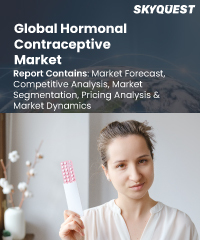
Product ID: SQMIG35I2132

Report ID:
SQMIG35I2132 |
Region:
Global |
Published Date: February, 2024
Pages:
157
|
Tables:
62 |
Figures:
80
Hormonal Contraceptive Market size was valued at USD 16.98 billion in 2021 and is poised to grow from USD 17.3 billion in 2022 to USD 24.2 billion by 2030, growing at a CAGR of 4.31% in the forecast period (2023-2030).
Hormonal contraceptives are highly effective at preventing pregnancy when used correctly, but they do not protect against sexually transmitted infections (STIs). Therefore, it's important to use additional methods of protection, such as condoms, if you are at risk for STIs. These can also have side effects, such as headaches, nausea, breast tenderness, and changes in menstrual bleeding patterns, so it's important to talk to your healthcare provider about the risks and benefits before choosing a method.
The global hormonal contraceptive market is a rapidly growing industry, expected to grow at a compound annual growth rate (CAGR) of approximately 4.5% from 2022 to 2030. The growth of the market is driven by increasing awareness and acceptance of contraceptives, the rising prevalence of sexually transmitted infections, and the growing demand for effective family planning methods. Among the different types of hormonal contraceptives, oral contraceptives are the most widely used, accounting for the largest share of the market. The combination pills segment, which contains both oestrogen and progestin hormones, holds the largest market share due to their effectiveness and convenience of use. However, the progestin-only pills segment is expected to grow at a faster rate due to their lower risk of side effects and suitability for women who cannot take oestrogen.
US Hormonal Contraceptive Market is poised to grow at a sustainable CAGR for the next forecast year.
Our industry expert will work with you to provide you with customized data in a short amount of time.
REQUEST FREE CUSTOMIZATIONWant to customize this report? This report can be personalized according to your needs. Our analysts and industry experts will work directly with you to understand your requirements and provide you with customized data in a short amount of time. We offer $1000 worth of FREE customization at the time of purchase.

Product ID: SQMIG35I2132